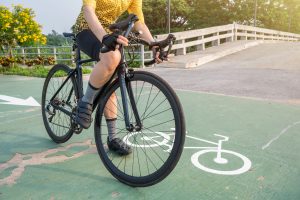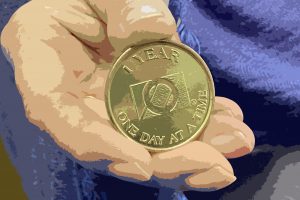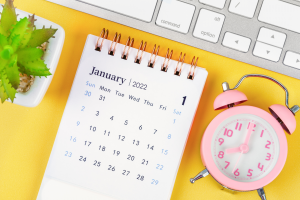Abstinence in OA is defined as “the act of refraining from compulsive eating and compulsive food behaviors while working toward or maintaining a healthy body weight.”
1. What were your early days of abstinence like? What else changed besides the food?
My early days of abstinence were a shocker. I was abstinent from compulsive eating, but I did not think I could stay on a food plan that removed sugar and flour and reduced quantities. I thought I would be hungry, but surprisingly, I was not. I was also completely honest about my “allergy-of-the body” foods. For example, an early OA food plan allowed for artificial sweeteners, but I knew I could not have artificial sweeteners since it created cravings. I also had to abstain from weight-loss exercises since it was an allergy-of-the-body behavior.
Not only did I commit to the food plan, but I also decided to work the program. The people who were abstinent had long-term abstinence, and it was the majority of the people in the room. The abstinent ones had a normal body size, were full of energy, and were smiling. I committed to doing my reading and writing on the Steps, going to three meetings a week to carry the message, making three service outreach calls per day to carry the message, and calling my sponsor every day to report my food and to talk about my Step work writing.
2. When you let go of the food, what did that make room for in your life?
Once I surrendered to my Higher Power (HP) and the Twelve Step program, I was granted daily abstinence, and it made room for so many things. I addressed my anger, my fear, my dishonesty, my insecurities, my low self-esteem, my arrogance, my need to control, my broken relationships, and other forms of selfishness. Abstinence allowed me to develop a relationship with my HP and helped me to amend my relationships with my family, friends, co-workers, and institutions. Today, abstinence allows me to work the Steps throughout the day, allows me to be of service to the community without having to be either domineering or a doormat, and allows me to be available for my family, friends, and fellow compulsive eaters.
3. How do you get through difficult times without turning to food?
When I go through difficult times, I turn to my Higher Power instead of the food. I understand from the depth of my being that alcoholic and excess foods will kill me. My HP helps me by providing me strength and courage to face difficult times. I constantly remind myself I am not HP, and I am no longer running the show (“thy will, not mine, be done”). If I am fighting anything or anyone, I look directly for selfishness, self-will (wanting my way), dishonesty, resentment, and fear. Sometimes, it is not clear, and I patiently pray that my HP show me. The answer comes through meditation, reading, or an outreach call. Once I know, I humbly ask my HP to remove it, admit it to someone, make amends if I have harmed anyone, and then help someone.
During my ten-year abstinence, I went through a difficult time when my father and sister were in the hospital at the same time for separate issues. I was consistently working my program, but one time, the voice of the disease snuck into my mind when I was at the grocery store. I heard the football snack display call to me. I heard myself say “If I have one, I will need to eat the whole football snack display!” I was terrified, ran out the store, and called my sponsor. I learned I had to address a deep underlying fear of both my father and sister dying and surrender them to my HP.
4. How do you encourage and support others who are new or struggling with abstinence?
I encourage and support others by sharing my experience, strength, and hope. I tell them to find a sponsor so they can work the Steps and find their Higher Power. Only a Higher Power can take on the deadly disease of compulsive eating.
5. How has OA service supported your abstinence?
I love doing OA service; however, I have to be highly conscious of why I am doing OA service. Am I doing it to gain popularity, to boast, or to show that I am smart? If I am doing self-serving OA service, then I need to graciously bow out because my abstinence will be negatively impacted. I have to do Higher Power directed OA service where I can carry the message of the Steps through outreach calls, being a speaker at a meeting, and sponsoring.
6. Has your abstinence changed over time? If so, how is your abstinence different now compared to when you first started in OA?
My abstinence has gotten stricter. For instance, for breakfast, my food plan allows for one apple. When grocery shopping, I picked the largest apples. One time someone brought me an apple the size of a grapefruit. I heard my mind say, “that is one apple, and I am allowed to have it.” I knew that was wrong, so I spoke to my sponsor and discovered I am a volume food addict. So now, I’m committed to measuring all of my foods. I know that my disease is progressing, so I have to watch out for new alcoholic foods and behaviors.
7. How have you maintained your abstinence around those who do not understand your commitment?
People around me do not have to understand my commitment to my program. It is my program, and I own it. I bring my food with me wherever I go. If my food is available at the venue, I bring my scale, and I measure my food. I’ve learned it is not about me being different or being a weirdo: My HP tells me that I am being of service. Many restaurant workers have come up to me on my way out and let me know they were inspired. Co-workers have looked into their own ways of eating and made their own adjustments. My primary purpose is to carry the message to other compulsive eaters and one small way to do that is to weigh and measure my food wherever I go. In case someone challenges my food program, I do not argue with them. I may explain to them my situation, set a boundary, or choose to get back to them later so I can first consult with my sponsor and/or my HP.
8. Has your cultural/racial/religious background had an impact on your abstinence?
Not one tiny bit. My disease is only interested in making me a slave and then taking me out. My disease would love my cultural, racial, and religious background to impact my abstinence. I have surrendered all these things and more to my Higher Power. My HP provides me directions, care, courage, and strength to manage any topic that gets in the way of my abstinence.
9. If you have experienced relapse, what helped you regain your abstinence?
I started OA 29 years ago, and in my first 19 years, I was abstinent from recreational sugar (cookies, cakes, and candy) but not abstinent from compulsive eating. I used to think that being on my food plan and being off of recreational sugar meant I was abstinent. If I slipped and ate pizza for instance, I would use the Tools by calling my sponsor, writing about why I went off my food plan, and then start my food plan again. Sometimes, I would not cave to the “bad” foods by using the Tools. I would make an outreach call, go to a meeting, or do some writing, and I would be saved from relapse. I did this over and over again. I did not realize it at the time, but my mind and body somehow managed to get me back on my food plan. My mind and body were not powerless.
I was on the on-the-food-plan/off-the-food plan cycle until one day I could not get back on my food plan. My mind and body could no longer manage to get me back on the food plan, and I ate compulsively throughout the day. My mind and body became powerless in stopping me from compulsive eating. I became a slave to the food and ate even though I did not want to. Looking back, I can see now that I was not using the Tools or working the Steps or surrendering to HP to deal with fear, anger, dishonesty, and selfishness. I’ve also realized that my food plan contained alcoholic foods and behaviors.
I needed a Power greater than me to create a miracle to put me on a HP directed food plan. I became abstinent from compulsive eating in 2014, and in the last ten years, I have not experienced relapse.
10. How do you feel about abstinence in OA?
I am grateful for my abstinence because I am free from compulsive eating, free from the craziness that goes with it, free to be of maximum service to my HP and humanity, and free to experience the promises and found on pages 83–84 and the “hidden promises” found on pages 84–85 of the Big Book (Alcoholics Anonymous, Fourth Edition).
—Lisa A., California USA





